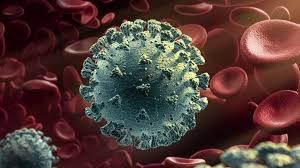
COVID Infection Affects the Heart too!
by Adel Eldin, MD, FACC, FACP, MBA, GGA
COVID-19 is a respiratory disease, so the lungs are usually affected first. but a recent study in March showed that the heart can be affected by Coronavirus as a complication of the acute respiratory infection in one-fifth of cases. It starts with a flu-like illness which may progress a week later into a congestive heart failure. Acute heart attacks ( Myocardial Infarction ) have been reported which could be precipitated by extreme stress or inflammation of the heart muscle ( Myocarditis). Thus patients can complain of chest pain with subsequent weakness of the heart muscle leading to increased shortness of breath, leg swelling, abnormal elevation of markers of heart muscle injury such as ( high sensitivity Troponin T). Increase the level of N-terminal Pro-Brain Natriuretic Peptide ( NT-Pro BNP). Abnormal Electrocardiograms (ECG) have been reported, abnormal echocardiogram studies ( ultrasound images of the heart), but no obstructive Coronary Artery Disease found on Cardiac catheterization ( Coronary Angiogram).
The proposed mechanism of myocardial injury could be related to inflammatory cytokines released leading to a cytokine storm which can cause a reduction in coronary blood flow resulting in decreased oxygen supply to the heart muscle cells. The beneficial effect of ACEI ( Angiotensin Converting Enzyme Inhibitor ) or ARB ( Angiotensin Receptor Blocker ) therapy is related to decreased pulmonary inflammatory response among those presenting with viral pneumonia and are considered to be very important medications in the treatment of congestive heart failure due to viral infection and should not be stopped.
Impairment of the heart muscle function can be associated with fatal heart arrhythmias ( such as Ventricular tachycardias). Even, therapies used to treat Coronaviruses such as Hydrocholoroquine and Azithromycin can cause prolongation of the QTc interval measured on the 12 lead surface Electrocardiogram (ECG) and can also lead to similar fatal heart arrhythmia if these medications are not monitored closely and stopped when there is an alarming prolongation of the QTc Segment on the (ECG). This can be done via a mobile app installed on a smartphone because of the physical limitation of having staff put the Electrocardiographic ( ECG) leads on the chest wall of the patients for fear of getting infected. Similar logistic concerns take place with regards to using the Cardiac Catheterization and its disinfection following the procedure. This may give consideration to a non-invasive and effective alternative testing such as CT Angiography instead of invasive conventional cardiac catheterization.
Chest pain, tightness, discomfort or sensation of pressure on the chest could be due to many reasons ranging from panic attack and anxiety after hearing or watching the news about coronavirus spread and fatality. It could be due to extreme stress which requires immediate evaluation especially if patients complain of chest pain, shortness of breath, breaking out in a sweat, feeling nauseous, feel extremely dizzy or passing out.
So, it is important during these tough times that people know what to do when the presenting symptoms show red flags and medical providers recognize that myocardial injury associated with Coronavirus infection is a marker of high mortality. Thus, implement an early aggressive treatment strategy to minimize the number of fatalities due to the acceleration of symptoms especially shortness of breath due to combined lung and heart injury. Hence, allocate the needed equipment such as ventilators and supportive treatment early to maximize their chances of survival!
I would like to let my healthcare colleagues on the front lines fighting this pandemic everywhere, you are appreciated by everyone and yes, we will get through this together!



